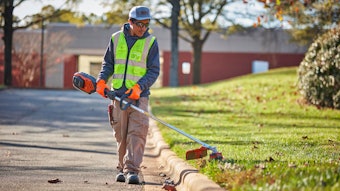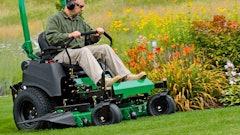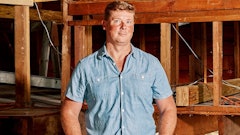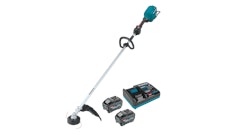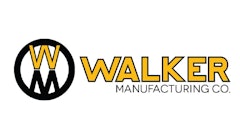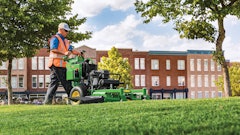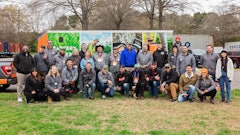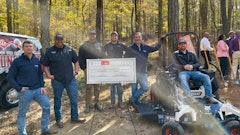
The word professionalism gets thrown around a lot in the green industry, so much so that its meaning can become diluted and distorted. In one extreme it’s reduced to mere appearances, such as shiny trucks and spiffy uniforms. And in other instances it’s inflated to lofty but largely meaningless abstractions like “quality service.”
Matt Doerr has shiny trucks and provides quality work. But for him, professionalism is more than just logos and lip service. It’s a business model, a blueprint for operating his company.
Doerr focuses his attention as an owner and manager on the innumerable things that communicate professionalism to current and potential clients, and constantly on the lookout for what counteracts that message.
“When I meet a potential client I figure I have two minutes,” he says, “two minutes for them to size me and my company up, and also for me to size them up. I have to get across that we’re trustworthy; that despite all the stereotypes about small companies we’re uniquely capable of getting the job done right and that they’re trust in us will be well placed.
Most importantly, Doerr says, that message has to harmonize with everything the customer has ever heard and seen about the company. He says that means paying attention to all the signals, both large and subtle, the company is sending. “We have to maintain our focus and be as close to a 10 as possible in everything we do.”
Taking the long view
Doerr had a very specific vision for what he wanted his company to be when setting out three years ago, due in large part to his experience as an account manager for a larger company.
“I knew I wanted to focus on maintaining larger commercial properties, where we could focus our efforts on a relatively small number of accounts. I think we do our best on bigger properties, and we avoid a lot of drive time. And I didn’t want to compete on price in the residential market,” he says.
He continues to provide both commercial and residential application services, which he says has provided high margin and good cash flow. He had planned to grow the application side more, but with rising fuel and product costs he’s put most of his effort toward growing maintenance. He also added $160,000 in off-season revenue since last fall with seasonal decorating and snow removal.
Although the company did perform residential maintenance in its first season to establish itself, Doerr worked diligently to break into the commercial market. For efficiency’s sake he clustered residential work around a handful of commercial accounts, gradually drawing back from the former.
He invested considerable time in networking with the local business community, both as a means to meet potential clients but also as a source of support and advice. He continues to attend a business breakfast club on Thursday mornings, and a Christian business leader meeting Thursday afternoon.
“I think many get the wrong idea when they hear the word ‘networking,’ that it’s about glad-handing and name-dropping. But it’s not about that at all. I went into it wanting to develop genuine relationships and learn from others, and that’s exactly what has happened. It’s amazing how much business leaders have been willing to listen and help out on all kinds of issues.”
He also signed his company up with the Professional Landcare Network (PLANET), through which he obtained his Certified Landscape Technician (CLT) status and is currently working toward passing the Certified Landscape Professional (CLP) exam. “It’s a great source of information and contacts, and the certification is a crucial credential for a company our size.”
Intelligence work
Doerr’s contacts have also given him invaluable insight into the market. “I was able to quickly learn who my potential customers were, who the contact is and when properties come up for renewal.”
Such intelligence gathering helps him choose the right accounts for his company. “I bid where we can make a profit, but the property also has to be a gem and it has to be the right fit for us. It has to have irrigation, for example, and I have to know the other contractors who do any other work that will affect the appearance. I consider every account to be a calling card; we’re putting our name on the line.”
He says he avoids the temptation to dive into other services for the sake of landing extra business. “We’ll find other high-quality providers for other services and manage everything, if that’s what the customer wants. But if we fly off in other directions, we’ll lose our focus Doerr says he maintains a list of properties that fit the bill, and submits a proposal on bright yellow paper—the company’s trademark color—each season. “We know what customers we want, and that we’ll get them eventually. But we’re not going to take the shortcut and go for the lowest bid. I’ve learned to be patient, and not jump on the first opportunity that comes around.”
He explains that a previous employer did exactly that: bidding low for a massive, multi-contractor account. “They tried to shoot for the golden ring,” he says. “But the terms were terrible; no one could get paid until all the work was done to exact spec. It threw cash flow into a tailspin and eventually the whole company unraveled.”
A big opportunity
When Turf Appeals’ golden ring appeared, in just its second season, Doerr knew it was the right opportunity. His networking efforts had turned up an opportunity to bid on Oklahoma City University’s entire campus.
The relationships he had established also laid the foundation of trust needed to win the account, which had been held by a national firm. “I think there would have been a lot of trepidation awarding this to a company as young and as small as we were,” Doerr explains. “But I was able to explain that the level of service they had been given and the quality of work they had been paying for was unacceptable and precisely how we would improve both.”
Winning the account, Doerr brought in a full-time, experienced account manager who had managed grounds for the city—another payoff from his networking efforts—and established a dedicated crew for the campus. He also negotiated the use of a large dumpster for waste disposal and a shed for on-site equipment storage.
He then spoke with the dean of every building on campus, as well as numerous office workers, to determine what improvements and adjustments were needed. He continues to seek their input.
“I try to speak with those people who are impacted the most by the work we do—like the secretary who sees a hedge every time she looks out the window. She may like to see a hedge hand-pruned as opposed to trimmed, or vice versa. If she’s satisfied with the quality of the work, or hopefully impressed, we’ve won an ally. It’s so easy to overlook the influence people like that have, negatively and positively, even if they don’t ultimately make the decisions.
A big test
The university account was a plum prize for Turf Appeal, not just financially but also as a reputational building block. It was also a basket holding a lot of the young company’s eggs.
The improvement to the campus environment was noticed almost immediately. “We were thinking how much needed to be done when a student walked up to us and said how big a difference we were making to their daily life,” he says, noting that work on the campus has also brought him into contact with a number of prominent alumni.
The improvements also won praise from administrators. But suddenly a high-ranking office changed hands, and the new administrator suggested bringing grounds maintenance in-house to save costs.
“That’s always a risk we run,” says Doerr. “It’s tough, because the new person can’t compare our work to the previous company. And more often than not, they’re looking for ways to put their mark on the budgeting process and cut costs.”
But in this case, the chief financial officer, who’d been skeptical of the young company at first, went to bat for Turf Appeal and convinced the new administrator of the contract’s true value.
The CFO would come through again in the winter, when a freak ice storm struck the city. “The storm left 6 inches of solid ice on the ground,” explains Doerr. “The university was determined to remain open, because of their commitment to the students, their customers. So the pressure was on us.”
He says Turf Appeal’s crew did a great job of clearing the sidewalks, but without heavy equipment the roads looked hopeless. “We were ready to bite the bullet, but the CFO made a call and a wrecking crew showed up with its monster equipment-at no cost to us.”
Professional jujitsu
For Doerr, such instances reveal what professionalism’s really about, and the leverage it can provide an emerging company. “It’s about making that connection and establishing a mutual sense of trust,” he says.
That sense of trust is what big corporations strive to convey through branding with the implied message that “bigger means better.” And while that may be the case, Doerr says it can also work to his advantage.
“When I worked for a big national company, I was a number. Literally. My manager would call me into his office by saying, ‘Hey, 4841, get in here.’ Those companies often treat their customers the same way.
“I’ve found that, if I can just get over that initial hurdle of people’s ‘small company’ perceptions, I can turn that around. Where a big company’s inflexible, we’re adaptable. Where they try to cut corners, we go the extra mile.”
All he needs is that two minutes, he says.
